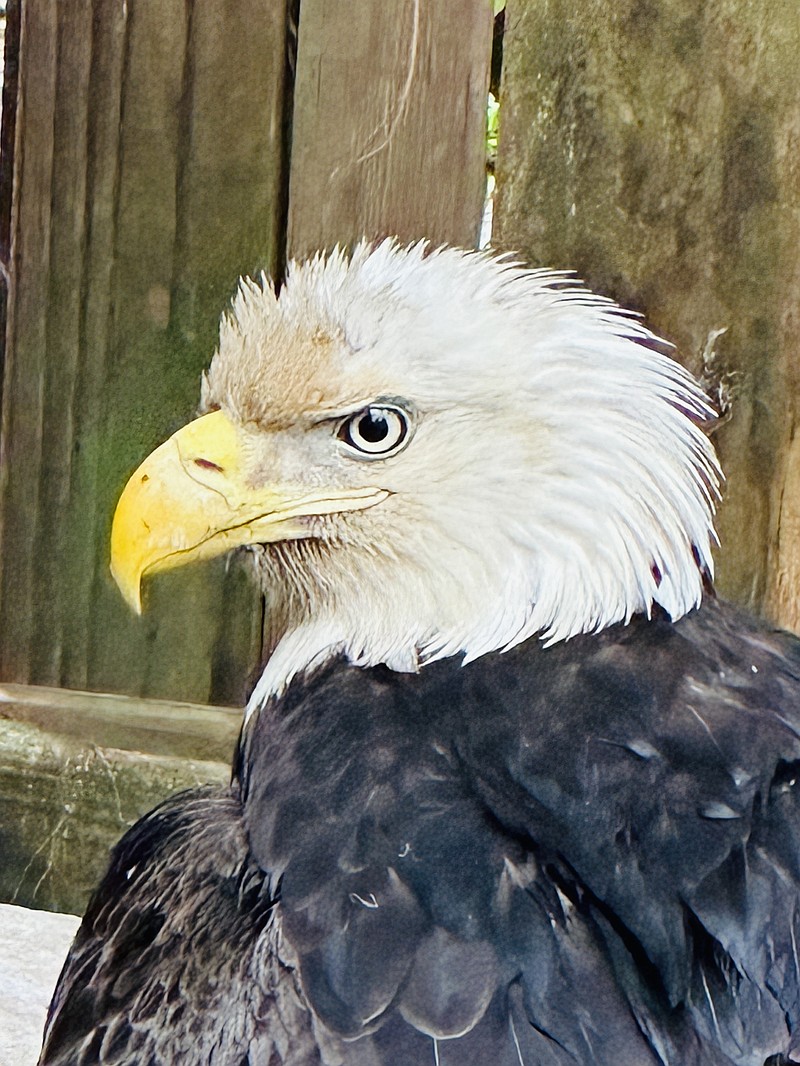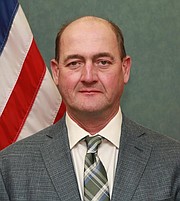A bald eagle found shot in Rhea County earlier this month is recovering from its wounds, but it won't ever be able to live on its own again, according to its rescuers.
A clock is ticking on federal rules regarding bald eagles, and Lisa Thomison, owner with her husband, Chris, of Owl Ridge Raptor Center in Grainger County, must find a permanent home for the eagle named Takatoka, or the bird could face euthanization, Thomison said in a phone interview.
Thomison said Athens resident Larry Eaton — the town's vice mayor and a frequent rescuer of all kinds of wild animals, domestic pets and even insects — worked with Tennessee Wildlife Resources Agency Senior Adviser Mike Bell, nearby residents and Eaton's wife, Lisa, to carefully capture the eagle and get him to wildlife doctors at the University of Tennessee.
"Some people that live there had been seeing it for days," Thomison said of the initial report on the injured eagle.
Thomison knew the bird was an adult eagle because the people who reported seeing the bird said he had a white head, she said. The birds, male and female, only attain their trademark white plumage after they reach five years of age.
Takatoka needs a permanent home soon because of a wing injury that prevents him from flying, she said.
"When you come into possession of a golden or bald eagle — with permits — you have to offer that bird to the Native American tribes — they get the first call on possibly using that bird as an educational ambassador," Thomison said.
Owl Ridge Raptor Center has state and federal permits to handle birds of prey, she said, but she's in no position to provide a long-term home. Native American tribes now have 10 days to decide whether to take such birds, she said, and then there's a 45-day federal clock ticking for a permanent home to be found or the animal could be euthanized.
Thomison, however, is confident she'll find Takatoka a forever home.
Eaton first received a report on the eagle March 16 from a homeowner who lives about a mile from Watts Bar Dam, he said in a phone interview.
"I had received a phone call from a lady that the eagle was at her house walking around, and it looked injured and emaciated," Eaton said. "I immediately called TWRA to let them know about the eagle."
(READ MORE: Bald eagles are nesting in record numbers in Georgia)
Eaton stayed at the home in Rhea County for several hours that day but he was unable to get close, and he didn't want to cause too much stress.
Around noon on St. Patrick's Day, Eaton said he, his wife and Bell, a former state senator, corralled the eagle, and Bell was able to put a net over it.
"I had my special eagle gloves on, and I grabbed the eagle," he said. "He was so emaciated, he was extremely submissive. Mike Bell was happy to help like he's always been. I knew it immediately had to go to UT."
The bird was rushed to Knoxville for treatment, along with photos from the discovery and capture — and it was kept for several days while receiving care, he said.
Eaton said he felt the eagle deserved a Cherokee name, so he researched a little and decided on Takatoka, a Cherokee principal chief who lived and died before the Trail of Tears began in 1838 and 1839.
"My childhood dream was just to be able to touch an eagle, but to be able to help an eagle that is suffering and to make sure it gets help was beyond my wildest dreams," Eaton said. "I am definitely wanting to see it get into a great rehab facility."
The eagle was found to have high levels of lead in his system, and his doctors believe he had been shot, Eaton and Thomison said. However, there was no lead found in his tissues, they said.
Shooting a bald eagle can cost the convicted offender up to a $100,000 fine, Thomison said.
"A lot of people don't know that," she said.
The Bald and Golden Eagle Protection Act and the Migratory Bird Treaty Act protect bald eagles, and violations of the act carry maximum criminal penalties of up to $100,000 and/or one year in federal prison.
Now, the search is on for Takatoka's next home, and Thomison said she has a couple of good leads.
"I will find placement for him," she said. "It's been a success story up to this point, and final step is placement."
Back in December, another bald eagle was found shot dead in the Watts Bar Dam area and was the subject of a $2,500 reward for information leading to a conviction.
Contact Ben Benton at bbenton@timesfreepress.com or 423-757-6569.

